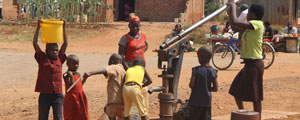
Safe and clean drinking water and sanitation are regarded as a basic human right, but what is happening in Bulawayo regarding the water situation, testifies to the abuse of human rights.
Report by Sheryleen Masuku
Women and girls bear the brunt of water shortages more than men and boys.
Women and girls are descriped as the “water-haulers” of the world by the United Nations Childrens’ Fund (Unicef).
International Law states that water should be accessible and affordable to everyone, but this is not the case in The city of Kings and Queens as Bulawayo is affectionately known.
On Monday, more than 150 women from Women of Zimbabwe Arise (Woza) took to the streets in the city centre protesting to the city fathers over the provision of water to local residents.
The protest was aimed at expressing the women’s grievances due to failure by the Bulawayo City Council (BCC) to adhere to their water-shedding timetable and an increase in water billing.
The demonstrations marked the height of the four-month-old water crisis in the City of Kings and Queens which saw BCC introducing 46 hours of water-shedding in July this year following diminishing water levels at the city’s five supply dams.
- Chamisa under fire over US$120K donation
- Mavhunga puts DeMbare into Chibuku quarterfinals
- Pension funds bet on Cabora Bassa oilfields
- Councils defy govt fire tender directive
Keep Reading
Currently residents in the city endure 96 hours of water- shedding per week while the UN states that when water is unavailable in the home, women and girls are used as water-haulers.
“On average, women and girls in developing countries walk six kilometres a day, carrying 20 litres of water, greatly reducing the time they have for other productive work or for girls to attend school,” Unicef says.
The UN agency further states that the poor are especially hard hit and a child born in Europe or the United States is 520 times less likely to die from diarrhea disease than an infant in sub-Saharan Africa, where only 36% of the population can access hygienic sanitation.
MP for Bulawayo Central, Dorcas Sibanda echoed these sentiments adding that lack of access to water creates problems for women empowerment.
“It draws back women and the girl child to the dark ages as they have to go and fetch water, especially the girl child as their time for studying is reduced,” she said.
“Water is a fundamental right and the city council should note that they are not doing anyone a favour by providing water because it is our right,” added Sibanda.
In a statement to NewsDay last month, Woza leader Jenni Williams said members of the organisation were extremely unhappy about the BCC’s failure to adhere to its published water-shedding timetable as this had led to immense suffering of women.
“Our members are extremely unhappy about the water situation and the effects are extreme on women in their person and in their role as mothers and heads of the home,” Williams said.
She said the accessibility of water has become a serious burden for women.
“It is the women and girls’ burden to search for water and only their heads seem to be suitable for the double burden of carrying it. This work has become engendered to women due to societal stereotyping of them as the cleaners of the home and clothing,” Willliams said.
Woza women complained that when the municipality bowsers came to supply water in the mornings and evenings, men present in the queues used their physical power to jump queues to access water first.
Studies by various humanitarian organisations on women and water reveal that sanitation is often viewed as a woman’s problem and they are usually the worst victims in areas with poor sanitation as they have to take care of young children.
International humanitarian organisations view women as primary promoters of hygiene behaviour among children and people most likely to benefit from improved water supplies in terms of alleviation of the burden of their domestic tasks.
Since the introduction of water-shedding, civil society groups have expressed concern over the increase in the practice of open defecation due to lack of water to use in the toilets.
At least seventy-nine members of Woza were reportedly detained at Bulawayo Central Police Station on Monday for staging the protest at the City Council Tower block.
“Many of the members attending the protest have not had water for weeks and when it comes it is dirty and undrinkable,” said Williams. Contacted for comment on the women leading water protests in the city, Bulawayo mayor Thaba Moyo said the council does not respond to demonstrations.
“We don’t respond to demonstrations, we respond only to official communication that we receive at our offices,” he said.












